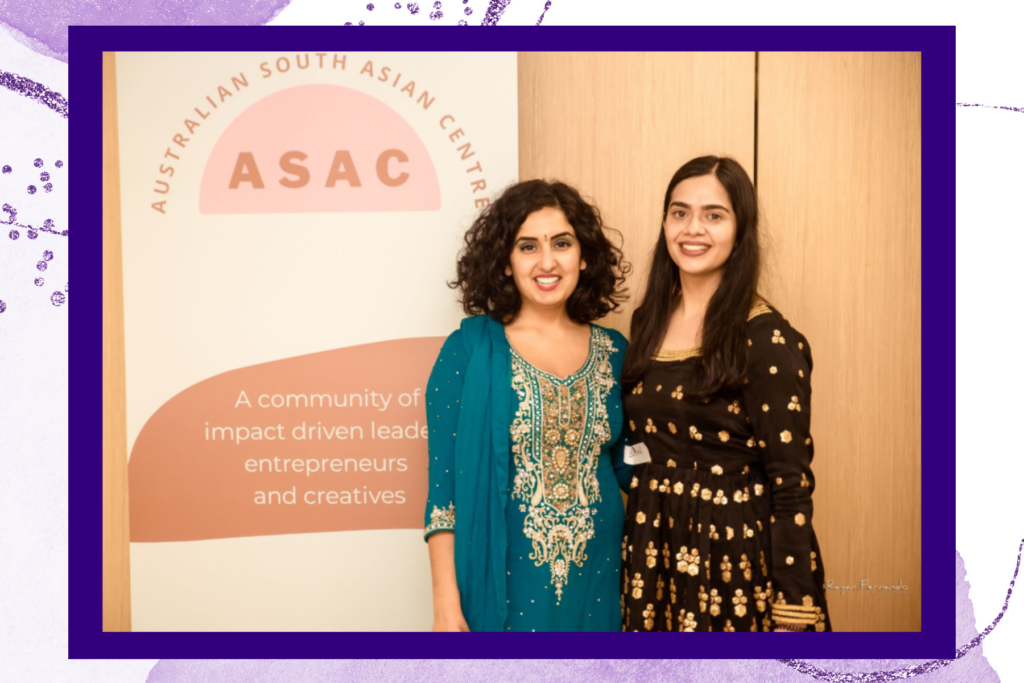
The Australian South Asian Center (ASAC) was founded in August 2020 to serve as a platform to highlight and bring attention to the accomplishments and ambitions of South Asian Australian women and create a community for these women to connect with and uplift each other. It takes an intersectional approach to deal with domestic violence and entrepreneur exploitation. The ASAC has become a voice for South Asian women in advocacy, career growth, mentorship and mental health/wellbeing.
Daizy Mann worked on Bold Punjab, an organization built to empower Punjabi women through entrepreneurship and leadership opportunities. However, making Bold Punjab was tough because Daizy needed funding and partnerships to create significant changes. During an interview with Shani Dhanda, a British activist in the U.K., Daizy was inspired to sow the seeds for a community in Australia with the same vision as Bold Punjab.
This is where Sehar Gupta stepped in. She had just completed her master’s and was looking for volunteer work. They connected through family friends. Daizy expressed her idea about the ASAC, and they started working on it the next day. Talk about the stars aligning!
Brown Girl Magazine contributor Garima Khanal sat down with the ASAC co-founders Daizy Maan and Sehar Gupta via Zoom to chat about their journey, community-building and the future of their group.
Before diving in, a shameless plug for our anthology “untold: defining moments of the uprooted,” which the good folks at ASAC recently held a book club for. We are so grateful and humbled to see our book (available for purchase on Amazon) make its way across the world to Australia.
View this post on Instagram
Garima: What is an example of when you witnessed a tangible difference that the ASAC made?
Sehar: During COVID-19, domestic violence issues escalated due to the lockdown. Daizy reached out to several women experiencing similar troubles and asked them to join her at a cottage on the beautiful foothills of Dandenong Ranges. Now called Soul House, it is Australia’s first wellness center and creative space dedicated to South Asian women (Indian, Pakistani). All profits go towards empowering women and the volunteers that lead this initiative!
Daizy: All the women continue to keep in touch via group chat. I stay connected with them too! When you come together for a cause, to help women going through a tough time, something beautiful always comes of it. They felt like they didn’t belong but left feeling themselves.
Garima: How has the community responded to the ASAC’s efforts?
Daizy: I had to pull out my 401 during COVID-19 and invest in Soul House. I was able to recoup this money but the experience worth it was for me and all the women we helped. The community came together for fundraising and I had an overwhelming response by reaching out to people through LinkedIn and Instagram. I individually messaged and reached out to people on Linkedin! I was genuinely amazed by the generosity of the people who donated.
[Read Related: Reshma Dordi: Promoting South Asian Culture to Mainstream America]
Garima: What goals do you want to reach with the membership applications?
Sehar: The idea is to look for people who have the same values, who care about giving and seva (service). It’s not about growing a brand or increasing social presence only, but if everyone has the same values, it can be about that. We take a very value-centric approach so that we can support members. We offer free membership to all our donors since they align with our values but plan to push paid membership in the next year.
View this post on Instagram
Garima: What inspired the South Asian Series:
Sehar: We noticed that South Asian Australian women don’t get recognized for their achievements and there aren’t many South Asian role models. The media or government does not amplify them, so we decided to launch the Stellar South Asian women series to promote five brilliant South Asian women who are kind, generous and give back to their community.
Garima: What sets the ASAC apart from other organizations?
Daizy: The ASAC is very different because people don’t come here to add this to their CV. We attract and look for members who focus on community and service. There must be interest and curiosity. Our organization is completely community driven and this is something very unique to us. In the future, we would like to pay our team and we are working grants.
[Read Related: Female Empowerment is Nothing Without Teamwork]
View this post on Instagram
Garima: What does the future of the ASAC look like?
Sehar: There is a bigger pool of women, women from Afghanistan, Nepal, etc., that we have yet to reach and connect with. We also want to continue to advocate — we currently lack South Asian women in positions of power that can speak up when needed.
Daizy: We want to reach 2 million women in the next couple of years and build a strong sisterhood with community at the core. We firmly believe that the strength of relationships matter. We want our work to influence policy, which can feed into Australian funding and eventually the South Asian community.
To learn more about the work being done by the ASAC, follow their Instagram page and their website. Head to this link to donate to the ASAC.




